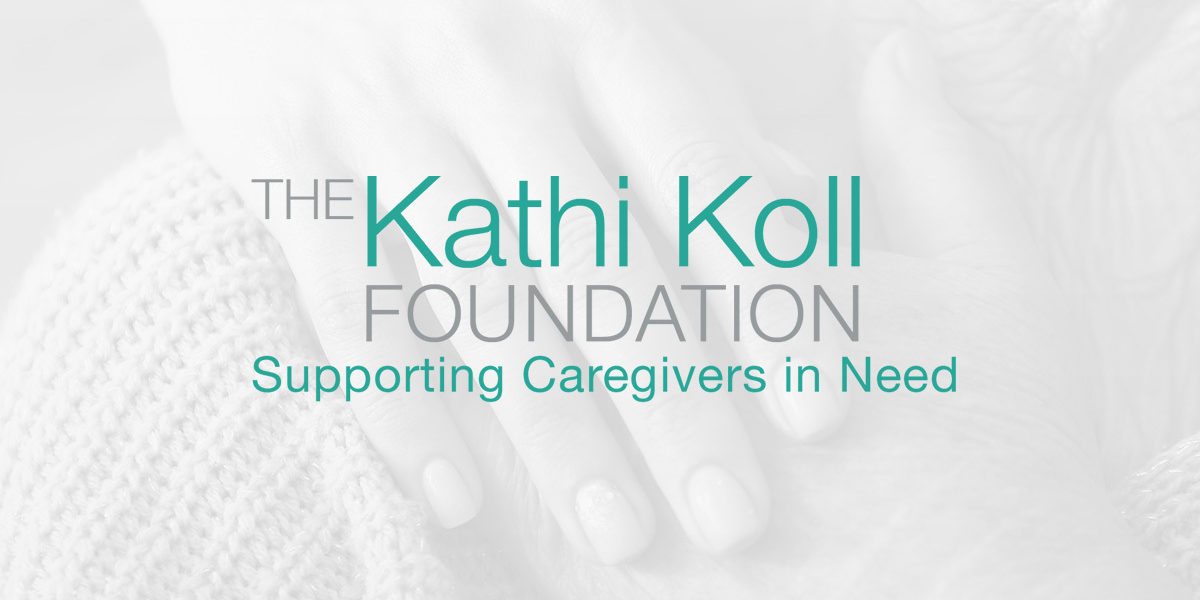A KKF Recipient Shares What its Like to be a Caregiver
The following is a Q&A with Suzanne A., a Southern California-based caregiver and recent Kathi Koll Foundation recipient.
Suzanne is a caregiver to her husband Gil, who suffered multiple strokes and is now a paraplegic. With Gil unable to work, Suzanne works part-time to support them.
Last November, Suzanne’s car broke down leaving her short on funds and unable to pay her storage bill, which housed many of their personal belongings. The Foundation stepped in to cover her storage bill, which prevented her from losing it.
Q: In what way did the Foundation make a difference in your life?
Suzanne: The realization that there were people who understood me without me saying a word–that was paramount.
The Kathi Koll Foundation helped me last year at a very pivotal time.
Having been with my husband 24/7 during a very rough patch, my income went to zero.
The Foundation paid a bill that helped me save my household belongings. My life and memories were in that storage unit.
There was no shame or guilt for not having paid a bill. The Foundation just said “we understand and want to support you.”
Strength comes in knowing you have people who care and just plain “get it.”
Q: Before Gil’s stroke(s), had you ever been a caregiver before?
Suzanne: I had no previous experience in caregiving prior to Gil’s stroke. I was definitely a “newbee.” Some days its a comfortable flow but most days are unpredictable and hard.
Q: What has surprised you about being a caregiver? Positives and negatives?
Suzanne: On the negative side, you don’t have any down time.
On the positive side, you get a lot of physical, mental and emotional strength when you are (constantly) placing another’s needs and care before your own.
Q: What does a typical day look like for you now?
Suzanne: Every morning, I have to assess what went on with Gil’s care the night before. Gil is currently at Post Acute Health Center in Orange County because of issues he was having related to his feeding tube. I am working to get him off his feeding tube and back home.
Because of the hemorrhagic strokes he suffered, he now has aphasia so I am his communication and need to be present and available to help with his care via the hospital staff.
I usually call the nurse on duty to check conditions or I go in early to see him and do the assessment in person. I am there daily between 9 to 10 a.m.
I leave late morning to try and work or handle Gil’s doctor appointments or his ongoing paperwork. I return every night between 5 and 6 to stay with him and do exercises with his arms and legs to keep circulation healthy. I usually return back home between 10:30 and 11.
Q: What are your biggest challenges?
Suzanne: Trying to keep a consistent schedule. As simple an answer as it would seem to ‘What does a typical day look like,’ there is absolutely nothing typical about my days. It can vary and go in so many different directions.
Because I am his communication, it is important for me to be on the spot and available to address his concerns and make certain his needs are met with patience, compassion and dignity.
Q: What keeps you up at night?
Suzanne: I have been blessed as the moment I put my head on the pillow every night, I fall sound asleep! The only concern I have at times is to make sure that I am able to hear the phone ring if Gil’s night nurse is calling. So, I do wake up periodically to check the phone. I even call the night nurse some nights to check in on him.
Q: What do you look forward to the most?
Suzanne: I am in awe of my husband’s strength and courage. Daily, I look forward to seeing the progress he shows. Sometimes, it is a big leap forward then a few steps back. But, he is determined not to give up so neither will I!
Of course, I love holding his hand and kissing him every day.
Q: What do people not know about being a caregiver?
Suzanne: Because of social media, our society has been introduced to many people who are caregivers that share their compassion and their struggles.
However, each caregiver has a unique dynamic. They are either a caregiver for a spouse, parent, grandparent, friend etc. and each situation is different.
It takes more than stamina, strength and time. It also takes a strength in your emotions. I would describe it as “emotional intelligence.”
It is imperative that caregivers understand that the person they are giving care for has a medical condition. Do not take anything personally. Understanding that a medical condition plus medications can make a person different at times. Be loving and be patient.
Q: Anything else you’d like to share?
Suzanne: It is always too soon to quit or give up! I am honored to be Gil’s wife and share this life with him.
To make an online donation to The Kathi Koll Foundation, please click here.


